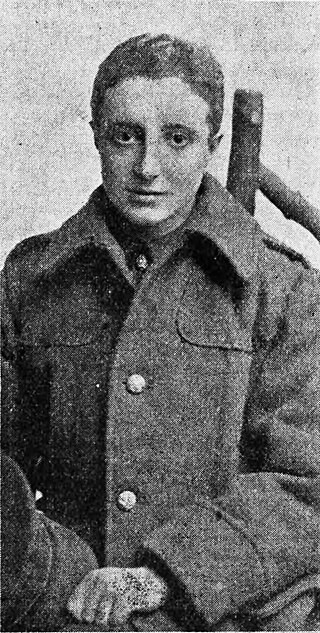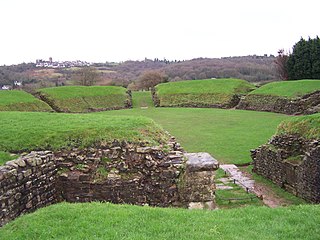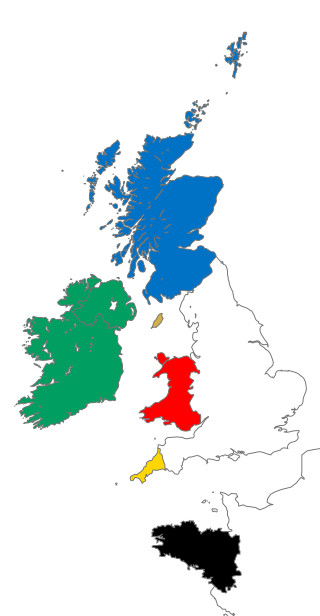Related Research Articles

Welsh is a Celtic language of the Brittonic subgroup that is native to the Welsh people. Welsh is spoken natively in Wales, by some in England, and in Y Wladfa. Historically, it has also been known in English as "British", "Cambrian", "Cambric" and "Cymric".

Saunders Lewis was a Welsh politician, poet, dramatist, Medievalist, and literary critic. He was a prominent Welsh nationalist, supporter of Welsh independence and was a co-founder of Plaid Genedlaethol Cymru, later known as Plaid Cymru. Lewis is usually acknowledged as one of the most prominent figures of 20th century Welsh literature. In 1970, Lewis was nominated for a Nobel Prize in Literature. Lewis was voted the tenth greatest Welsh hero in the '100 Welsh Heroes' poll, released on St. David's Day 2004.

Wales is a country that is part of the United Kingdom. It is bordered by England to the east, the Irish Sea to the north and west, the Celtic Sea to the south west and the Bristol Channel to the south. It had a population in 2021 of 3,107,500 and has a total area of 20,779 km2 (8,023 sq mi). Wales has over 1,680 miles (2,700 km) of coastline and is largely mountainous with its higher peaks in the north and central areas, including Snowdon, its highest summit. The country lies within the north temperate zone and has a changeable, maritime climate. The capital and largest city is Cardiff.

The Mabinogion are the earliest Welsh prose stories, and belong to the Matter of Britain. The stories were compiled in Middle Welsh in the 12th–13th centuries from earlier oral traditions. There are two main source manuscripts, created c. 1350–1410, as well as a few earlier fragments. The title covers a collection of eleven prose stories of widely different types, offering drama, philosophy, romance, tragedy, fantasy and humour, and created by various narrators over time. There is a classic hero quest, "Culhwch and Olwen"; a historic legend in "Lludd and Llefelys," complete with glimpses of a far off age; and other tales portray a very different King Arthur from the later popular versions. The highly sophisticated complexity of the Four Branches of the Mabinogi defies categorisation. The stories are so diverse that it has been argued that they are not even a true collection.

Welsh writing in English, is a term used to describe works written in the English language by Welsh writers.

William Williams, Pantycelyn, also known as William Williams, Williams Pantycelyn, and Pantycelyn, is generally seen as Wales's premier hymnist. He is also rated among the great literary figures of Wales, as a writer of poetry and prose. In religion he was among the leaders of the 18th-century Welsh Methodist revival, along with the evangelists Howell Harris and Daniel Rowland.

In Welsh culture, an eisteddfod is an institution and festival with several ranked competitions, including in poetry and music. The term eisteddfod, which is formed from the Welsh morphemes: eistedd, meaning 'sit', and fod, meaning 'be', means, according to Hywel Teifi Edwards, "sitting-together." Edwards further defines the earliest form of the eisteddfod as a competitive meeting between bards and minstrels, in which the winner was chosen by a noble or royal patron.

The Celtic Revival is a variety of movements and trends in the 19th, 20th and 21st centuries that see a renewed interest in aspects of Celtic culture. Artists and writers drew on the traditions of Gaelic literature, Welsh-language literature, and so-called 'Celtic art'—what historians call Insular art. Although the revival was complex and multifaceted, occurring across many fields and in various countries in Northwest Europe, its best known incarnation is probably the Irish Literary Revival. Irish writers including William Butler Yeats, Lady Gregory, "AE" Russell, Edward Martyn, Alice Milligan and Edward Plunkett stimulated a new appreciation of traditional Irish literature and Irish poetry in the late 19th and early 20th century.

Maesteg is a town and community in Bridgend County Borough, Wales. Maesteg lies at the northernmost end of the Llynfi Valley, close to the border with Neath Port Talbot. In 2011, Maesteg had a population of 20,612. The English translation of Maesteg is 'fair field'.

The National Library of Wales, Aberystwyth, is the national legal deposit library of Wales and is one of the Welsh Government sponsored bodies. It is the biggest library in Wales, holding over 6.5 million books and periodicals, and the largest collections of archives, portraits, maps and photographic images in Wales. The Library is also home to the national collection of Welsh manuscripts, the National Screen and Sound Archive of Wales, and the most comprehensive collection of paintings and topographical prints in Wales. As the primary research library and archive in Wales and one of the largest research libraries in the United Kingdom, the National Library is a member of Research Libraries UK (RLUK) and the Consortium of European Research Libraries (CERL).

Edward Williams, better known by his bardic name Iolo Morganwg, was a Welsh antiquarian, poet and collector. He was seen as an expert collector of Medieval Welsh literature, but it emerged after his death that he had forged several manuscripts, notably some of the Third Series of Welsh Triads. Even so, he had a lasting impact on Welsh culture, notably in founding the secret society known as the Gorsedd, through which Iolo Morganwg successfully coopted the 18th-century Eisteddfod revival. The philosophy he spread in his forgeries has had an enormous impact upon neo-Druidism. His bardic name is Welsh for "Iolo of Glamorgan".

Sir John Kyffin Williams, was a Welsh landscape painter who lived at Pwllfanogl, Llanfairpwll, on the Island of Anglesey. Williams is widely regarded as the defining artist of Wales during the 20th century.
The Wales Book of the Year is a Welsh literary award given annually to the best Welsh and English language works in the fields of fiction and literary criticism by Welsh or Welsh interest authors. Established in 1992, the awards are currently administered by Literature Wales, and supported by the Arts Council of Wales, Welsh Government and the Welsh Books Council.

The media in Wales provide services in both English and Welsh, and play a role in modern Welsh culture. BBC Wales began broadcasting in 1923 have helped to promote a form of standardised spoken Welsh, and one historian has argued that the concept of Wales as a single national entity owes much to modern broadcasting. The national broadcasters are based in the capital, Cardiff.

Literature Wales is the Welsh national literature promotion agency and society of writers, existing to promote Welsh-language and English-language literature in Wales. It offers bursaries for writing projects, runs literary events and lectures, and provides financial assistance for creative mentoring and other literary-based ventures. The organisation also selects the National Poet for Wales, and manages competitions including Wales Book of the Year, the Cardiff International Poetry Competition, and the Rhys Davies Short Story Competition.

Welsh-language literature has been produced continuously since the emergence of Welsh from Brythonic as a distinct language in around the 5th century AD. The earliest Welsh literature was poetry, which was extremely intricate in form from its earliest known examples, a tradition sustained today. Poetry was followed by the first British prose literature in the 11th century. Welsh-language literature has repeatedly played a major part in the self-assertion of Wales and its people. It continues to be held in the highest regard, as evidenced by the size and enthusiasm of the audiences attending the annual National Eisteddfod of Wales, probably the largest amateur arts festival in Europe, which crowns the literary prize winners in a dignified ceremony.

Parthian Books is an independent publisher based in Cardigan, Wales. It was founded in 1993 by Lewis Davies and Gillian Griffiths. An editorially-led publishing house, Parthian publishes a range of contemporary fiction, poetry, non-fiction and drama, as well as art books. It is also involved in the European literary scene. Parthian's motto is "A Carnival of Voices in Independent Publishing".

Theatre in Wales includes dramatic works in both the Welsh language and English language. Actors from Wales have also achieved international recognition.
Ned Thomas is a Welsh intellectual, editor and cultural commentator in the fields of politics, literature and language. His earlier works are in English while his more recent output is in Welsh. He writes from a background of familiarity with languages such as Russian, German, French, Italian and Spanish, as well as Welsh and English. He was a lecturer at the Universities of Moscow, Salamanca and Aberystwyth in the Department of English and has published studies of writers as diverse as the English writer George Orwell, the Caribbean poet Derek Walcott and the Welsh poet and activist Waldo Williams as well as a study of post-war Europe from an autobiographical perspective.

In addition to English, literature has been written in a wide variety of other languages in Britain, that is the United Kingdom, the Isle of Man and the Channel Islands. This includes literature in Scottish Gaelic, Welsh, Latin, Cornish, Anglo-Norman, Guernésiais, Jèrriais, Manx, and Irish. Literature in Anglo-Saxon is treated as English literature and literature in Scots as Scottish literature.
References
- ↑ Stephens, Meic (1973). The Welsh Language Today. Gomer Press. p. 141. ISBN 978-0-85088-208-7.
- ↑ Gwynne Williams at WorldCat Identities
- ↑ "Gwynne Williams at Welsh Book Trade Info". Archived from the original on 1 October 2011. Retrieved 29 March 2011.
- ↑ appearance by Gwynne Williams at Wrexham Library literary event